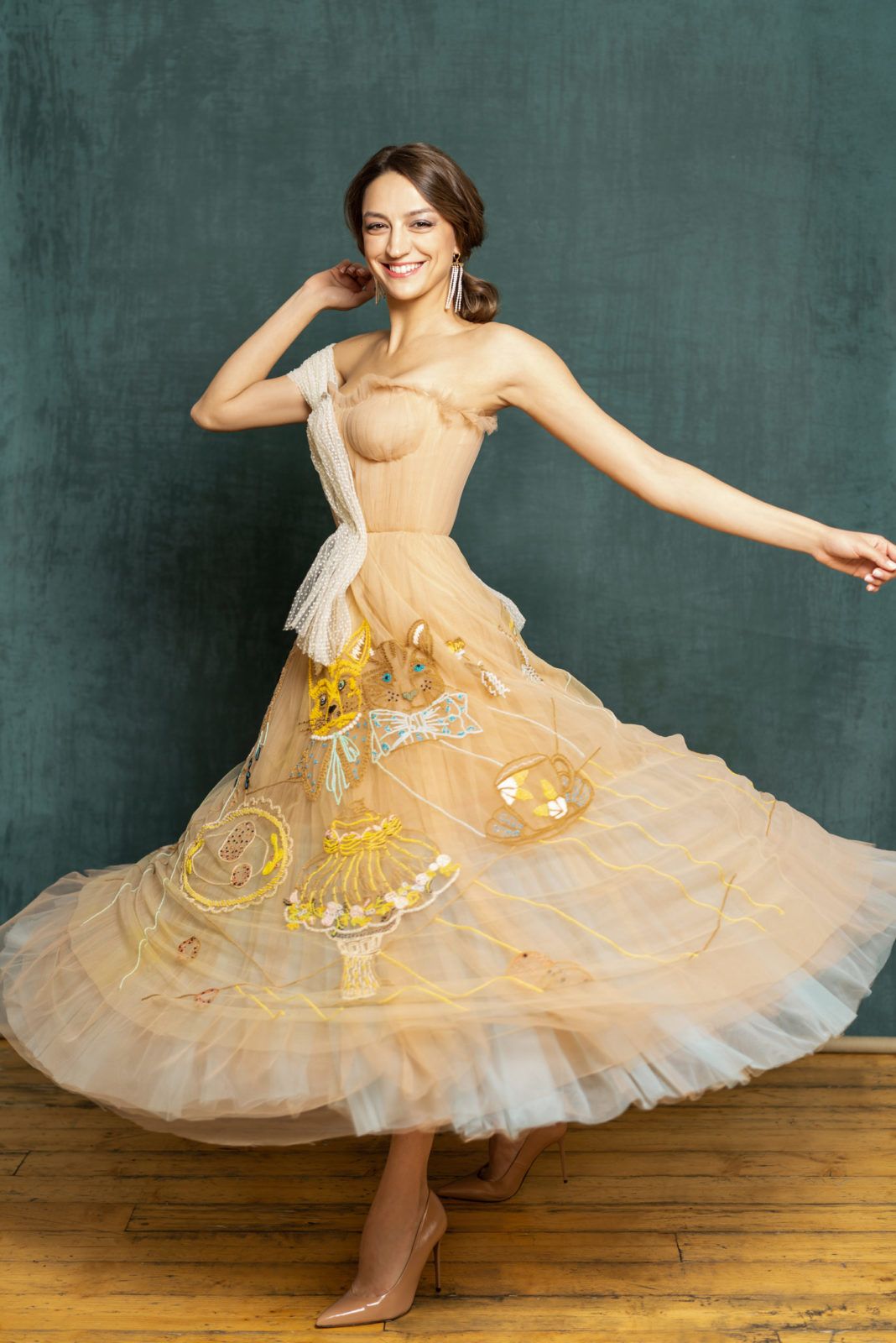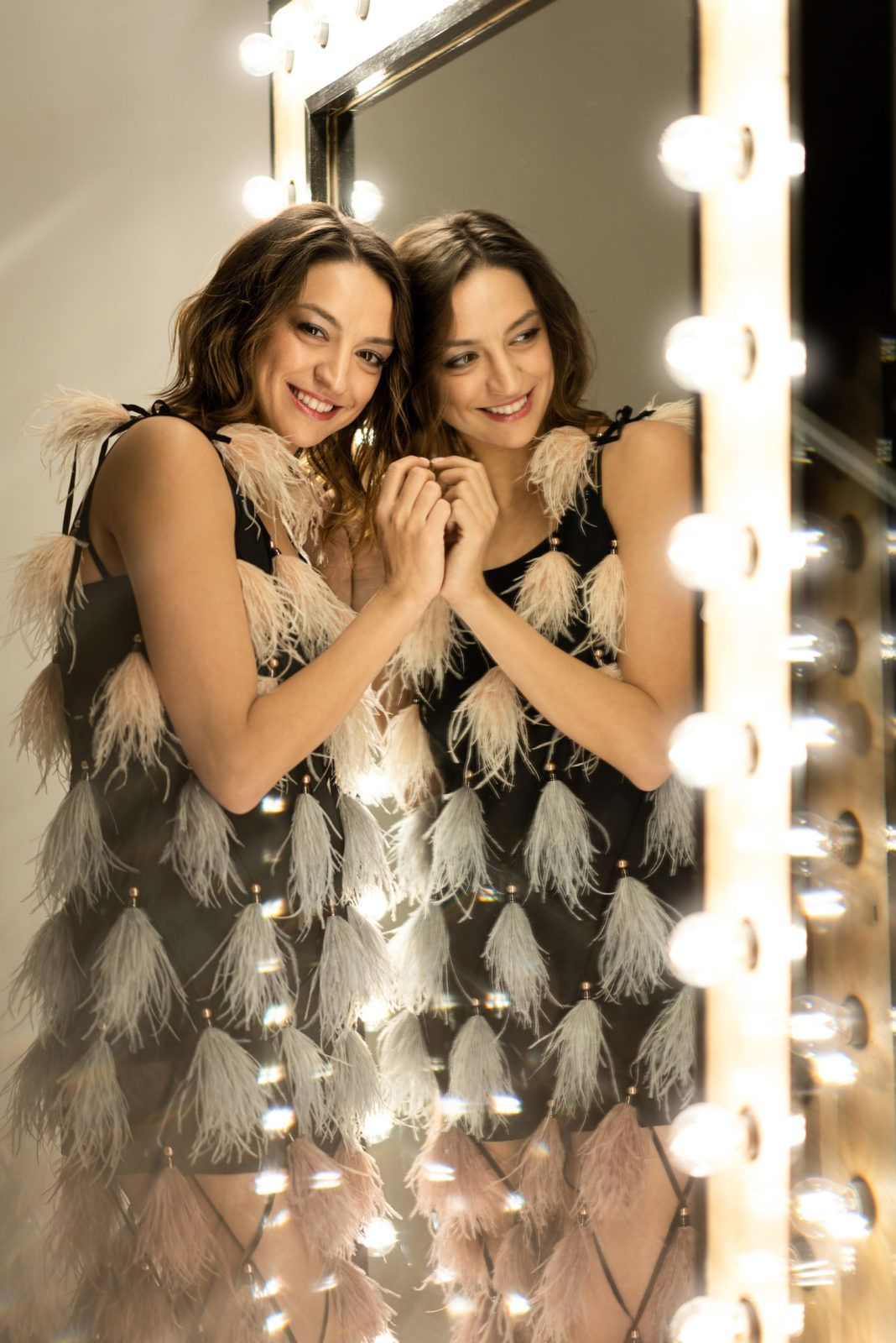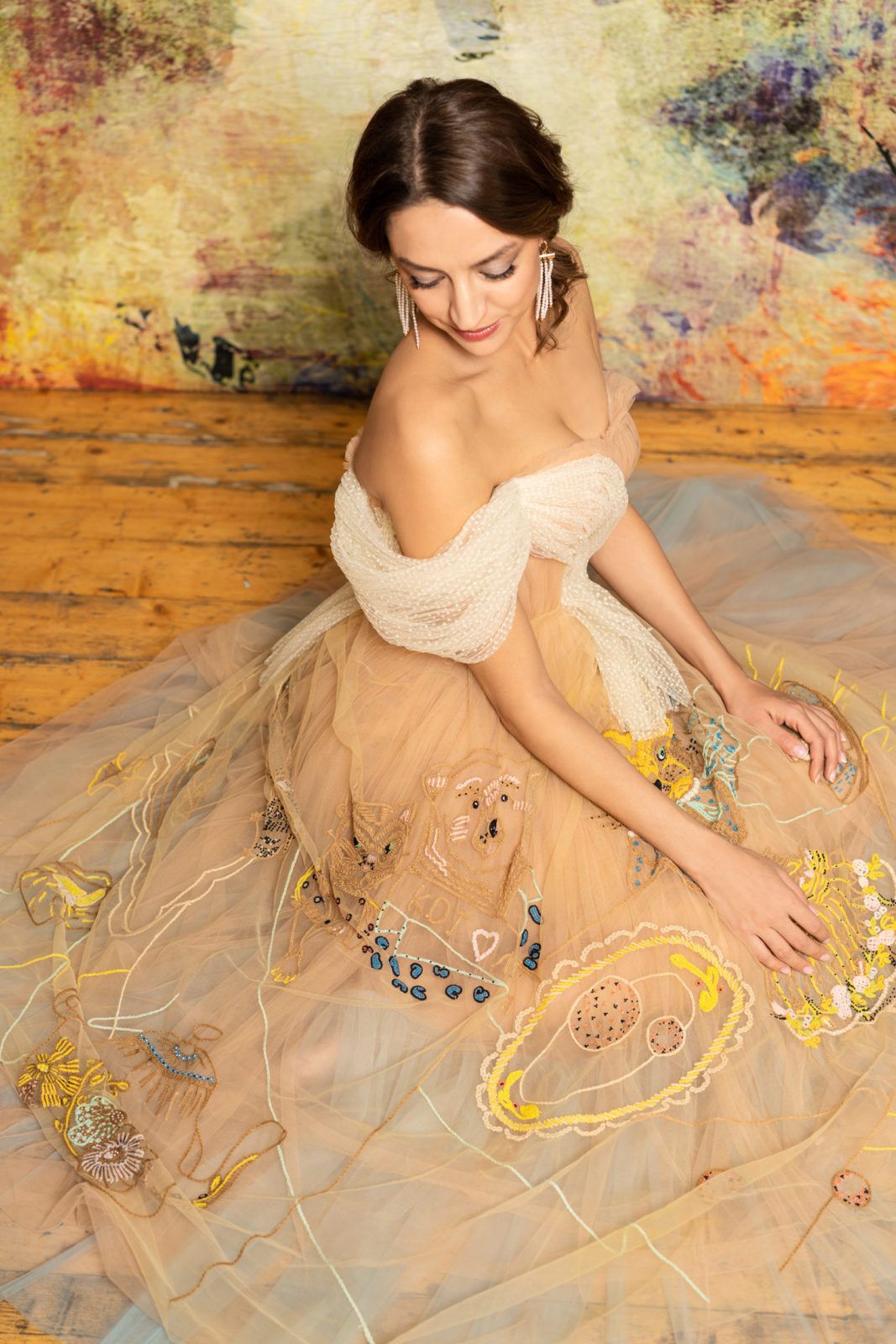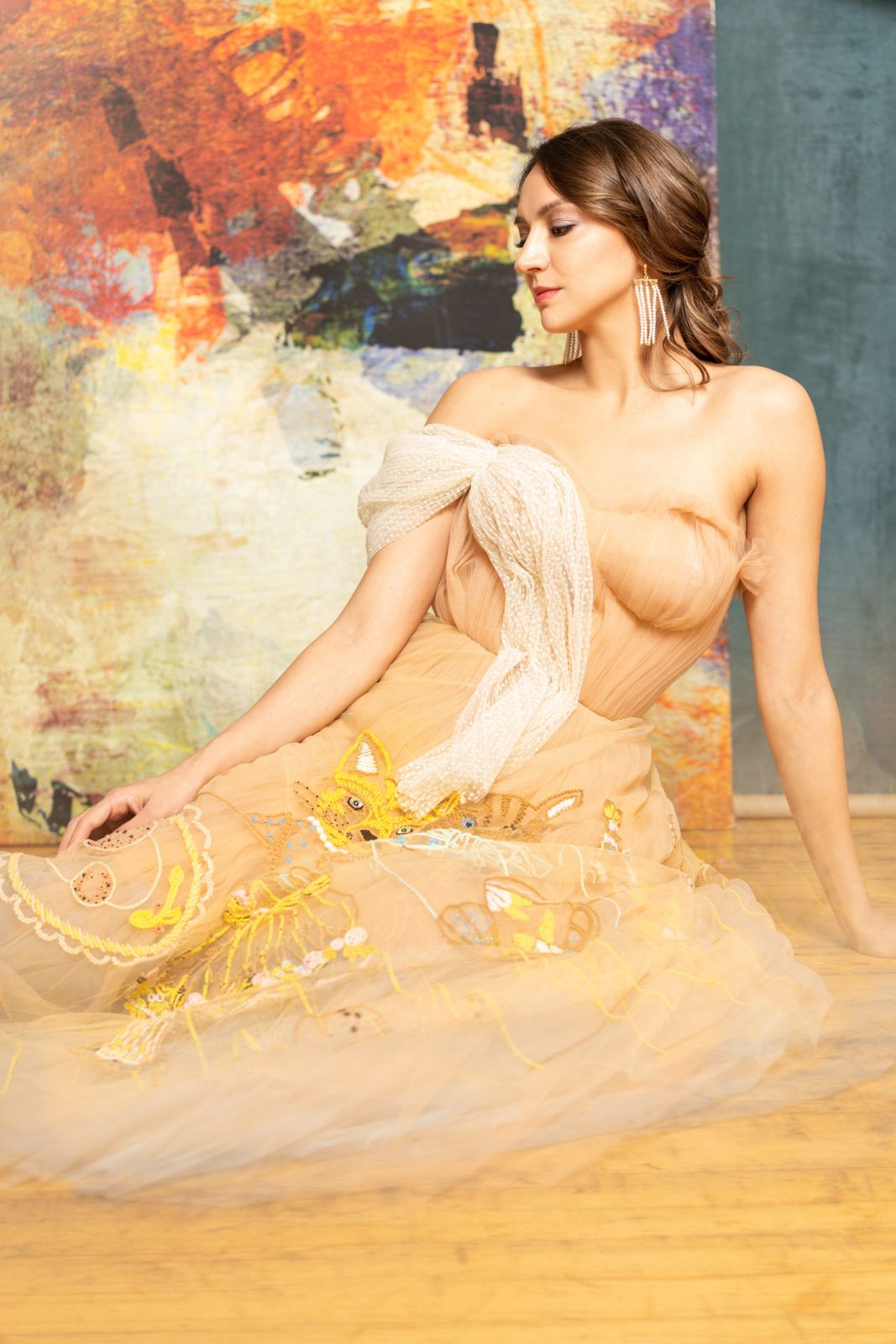How the only individual rhythmic gymnast in history to win two Olympic all-around gold medals couldn’t break with the rhythmic gymnastics?
Read the exclusive interview with Evgenia Kanaeva.
Interview: Angelina Krivova
Photo: Alisa Aslanova
Evgenia, tell us, please, how have you got into rhythmic gymnastics?
My grandma was a big fan of rhythmic gymnastics and figure skating, and my mother did these sports. My grandma took me to gymnastics, although my mother was against it, this sport was hard to come for her. She didn’t have physical abilities, she had very tight ligaments, but at the same time she was very hard-working and well-coordinated and she could achieve a rank of Master of Sports.
It seemed to my mother I wouldn’t manage, I was miniature but I had plump cheeks and I was very clumsy. Many of our friends laughed “Rhythmic gymnastics? Are you sure?” My grandma told “We are here to correct the feet and the kind of sport is beautiful”. In the sports school where Vera Shtelbaums and Elena Arais worked I was assigned to a weak group, because I was older than necessary when I came.
Once grandma took me to the morning training session and Vera Efremovna told “Why have you come in the morning? Your group trains in the evening”. My grandma got nervous “If so we are not to come anymore!” Vera Efremovna said “Ok, come in”. Yes, grandma had strong character! After the training Vera Efremovma told my grandma “Come one more time in the morning”. And finally she assigned me to the strongest group she trained.
Why did Vera Efremovna took attention on you?
Vera Evremovna started to train me not from the beginning, she took me to the group, but later she often left with Ira Tchachina. She always watched and worried about me, she is rather a coach for whom the most important talent is diligence. A sportsman may have some disadvantages, but everything is to be corrected if she has diligence. There were girls with good physicality, but, as a rule, those who had diligence, succeed. Many people told it could come nothing from me, but she saw a hard-worker, I didn’t take offenses and learned how to perceive the critics patiently.
Did you immediately like the working process in the gym and the gymnastics in general?
At the age of 7-8 years old I received a tape with the gymnasts’ performances, and Yana Batyrshina got strongly into my memory. I don’t remember what place she has won, but her exercise with a ball to the music from the Scheherazade ballet impressed me so much. She fulfilled a very complicated body difficulty called Dynamic Balance 2 or 3 shapes, later called Utyasheva body difficulty, although Batyrshina was the first one who fulfilled it. Yana had inspired me, I moved to the sofa to learn this element, because I was scared to fall down, I didn’t understand how to do it.
Later Ira Tchachina became an example for me. I was lucky because she trained with us from time to time, when she arrived from the training camp. I was pervaded by rhythmic gymnastics day by day, I stayed to watch other gymnasts. Of course, it all came from my grandma. And mummy always told “If you do something, do it consciously and fully give yourself, work honestly, without thinking if it turns out or not”.
When did this thought appear – to do high-performance sport?
When I was 10-11 years old Vera Efremovma often took me to Novogorsk, where she trained Ira Tchachina, and later I was invited to the junior national team. But nobody can predict such things! I often see now how the parents come and say “My daughter is gonna be a star!”
In principle, even the highly experienced coaches can’t tell the gymnast’s future. For example, you can see a girl with good physicality, but it may come through changes while awkward age. Everything is so individual.
In my case a passage to a high performance sport happened due to my wild desire, that had been formed in the Omsk school where everything was very strict – you took a prize, good, but next day you had to start your work again. There was no emphasis that you were better than others. There are 30-40 girls who are training in the gym, and you are just one of them, no matter that you come to the competition, only work matters.
There were no highlights for us in Omsk, on the contrary they could scold us, but, of course, always for the matter. It’s the Omsk school where they never praise you, because children react differently when they are praised in early age, some of them become too self-confident and stop listening to the coaches, and if you stop listening to your coach the results will decrease immediately, no matter how talented you are. Perfectly if parents or a coach can explain it to a child.
What are other differences of the Omsk school?
Rhythmic gymnastics is probably the most popular sport in Omsk. The children are very physically strong, they’ve got wonderful basics, that has been elaborated by generations of the outstanding coaches – Galina Pavlovna Gorenkova, Vera Efremovna Shtelbaums and others. Now the experience is to be transferred to the young coaches.
What was the most complicated for you when you joined the national team?
At the beginning it’s difficult to make the way and to gain the name. For a national team gymnast, it’s difficult to overcome yourself, to find a motivation, not to pay attention to the unpleasant situations when the rivalry takes place. For me such a system is important – to keep the humanity, never to blame a rival and to learn from him. You should have cool attitude toward everything, not to react and listen to your coach. Our sport is subjective, but earlier or later everything goes to its place. In spite of anything the one who deserves one day becomes a champion!
Could you overcome all the difficulties in Novogorsk without your personal coach Vera Efremovna?
You can’t tell about anything that hasn’t existed. I can’t separate myself from Vera Efremovna. I am so happy that I’ve became her sportsman and that she has passed all this long way with me, I am always grateful to my coach. And happy that I’ve got to Novogorsk in the times of Irina Aleksandrovna Viner-Usmanova, because every coach may have its own opinion, sometimes they may not coincide, but Irina Alexandrovna has the main advantage, she may find the common ground with everyone. This is very complicated, because everyone has ambitions and wants to be a favourite of the principal coach. Thanks’ God, the worked-out system exists – we listen to each other. All fell out as it did and gave its results. Everyone, who was by my side, contributed to the wins.
Your character – has it existed since childhood or has been built by sport?
The sport has built, the team has built, because different situations may happen. The people are different. Conflicts are the most terrifying for me. I don’t like conflicts; I am for peaceful decisions. There were difficulties only with this. I’ve been tempered step-by-step, gaining colder attitude, avoiding unpleasant situations. In a working field I constantly overcame myself, the coach told – “Tired? Work more! The best work is when you are tired” And I overcame, I did it again and again, although I was not very strong. The doctors told in my childhood that I had muscle weakness but later I managed to work out the strength.
To win… is it hard?
I would say so – when I was thinking about the victory, I always lost. And I always blamed myself after the misfortune – that I hadn’t worked enough, that I’d made an improper approach to the start. Since childhood I forbade myself making mistakes even at the training sessions, I set a goal – to start competing while trainings. I always thought the others are better than me, and that helped me to win. When Olya Kapranova and Vera Sesina performed together with me, it seemed to me I could never reach them, because they had wonderful physicality and they were very beautiful. Then I marked that Dasha Kondakova is very powerful, dynamic, with astonishing turns. I admire her because she is a unique gymnast. Dasha Dmitrieva has the unbelievably beautiful plasticity. I was lucky to perform with such girls. I didn’t think myself to be special. But everything coincided in my career – my coach’s diligence, Irina Aleksandrovna’s trust, she entrusted me to perform at the first Olympic Games although Olya Kapranova and Vera Sesina had moved to these competitions for four years.

Dress: Maisonesve; Jewelry: Meadowlark ( Poison Drop)
The fanaticism in sport – is it good or bad?
I was fanatical. But, of course, I listened to coaches’ advices. Sometimes when they said “enough” I did it out in spite, it also happened. I am not ideal, although someone says I am very diligent and have made everything by my own. No. I was so many trained and occupied. I am an ordinary person, a raw material. I simply loved my job. In reality I’ve been lucky with my parents and coaches. But it’s important to appreciate all this. The success consists of small actions and moments.
Please tell us how does it feel to get to the Olympic Games?
In 2006-2007 Vera Efremovna wanted to put me to the group exercise because there was strong rivalry in the individuals . Vera Efremovna thought over all the variants for me to perform in all competitions. I refused from the group program, not because I didn’t like it but because I wanted to perform exactly in individual program and I strongly believed in it.
2007 was a very difficult year, especially when I came through the selection to the Europe Championship with Alina Kabaeva, Vera Sesina and Olya Kapranova. We had equal chances with Olya according to the starts we won – I won two and she won two, moreover Olya had the World Champion title. Irina Aleksandrovna made a decision that Alina, Vera and Olya would perform. Of course, Alina was above any comparison, but she got an injury two days before the Championship. I was in Italy; my competitive season was over, the new one had to start in autumn. I remember I’ve been let not to train, to eat pizza and have rest. But I was so angry that I started to train hard. It happens with a child when he does something on the contrary. And then Vera Efremovna had a call, they said I would most likely to perform. In principle, Irina Aleksandrovna could give Vera and Olya an opportunity to participate with four apparatus, but Irina Aleksandrovna entrusted me to perform. I always dreamt to perform in all principal competitions. I liked training and performing, I was very hungry for everything.
It was decided two days before departure what apparatus I would perform with. The final decision was made already on the training series. After I won the Europe Championship, I was told – “Finally you are preparing for the World Championship and you are selected to the Olympic Games!”
At the World Championship I performed only with one apparatus – the ribbon. The competition was very hard, but I had worked out the strength and when I started performing I didn’t have fear. I had no losses but I made a step while turn. I was wildly unsatisfied with myself and later Irina Aleksandrova announced in the interview that the Olympic team to be formed basing on the World Championship results – Vera and Olya would go. I read the interview and thought they had put a cross on me. It often happens with sportsmen, everyone wants to be special.
In 2008 I didn’t hope for anything, I though it would go how it should be. I didn’t suppose myself to be stronger than Vera or Olya, but as every sportsman I wanted to go to Olympic Games.
Do you remember your impressions when you’ve got to the Olympic Games in Beijing?
I could not believe, I was at the Olympic Games. I remember we’ve been sitting with Vera Efremovna and I tell her – “ Are we really at the Olympic Games?!” While qualification I lost the rope – at the first apparatus. I was shocked! Vera Efremovna told me “The most important is to get to the finals, to the round of ten”. I was sitting and thinking “Oh, my God! My mother is watching, Vera Sesina, who’s had to perform and has been able to do it better, is watching, and Vera Efremovna says me to get to the round of ten”. And then I just did everything automatically, because I had panic, different thoughts were rushing inside, I remembered everyone, I thought they relied on me. There were too many emotions but later I calmed down.
Did you watch the results of Olga Kapranova during that competition?
I’d never competed with anybody; I had a mission to do everything I’d worked out. That’s all. But during the all-around I strongly worried about Olya Kapranova. I met her, after she’d lost the clubs. I didn’t know, how she had performed, but when she entered she was so white-pale! That was terrifying, of course. For your whole life you come to you dream, prepare for the Olympic Games… And it’s so hard to go through it. But probably there is always sense in God’s tests. It was so painful about Olya. Humanly, I felt very sorry for her. Later I didn’t go to the Russian House, I stayed with Olya, she was so distressed. In such moments you think the whole life is destroyed. But she is a survivor; she could rise and performed at the World Championship one year after.
How did you find a motivation to prepare for the next Olympic Games, after winning once? To start everything from the beginning, new four years full of restrictions, everyday workouts and overcoming?
It was harder to prepare for the second Olympic Games. The body was changing, I felt differently my body at the gym for these four years. I had no vigor in 2009, my legs gave up. The young stars – Dasha Kondakova and Dasha Dmitrieva had been already training with me. The young generation pushed, that was my motivation.
It was very difficult at the World Championship 2010, I didn’t get to one of the apparatus – the ribbon. It was hard for my coach – Vera Efremovna, because she was used to my stability – that I trained and performed well. It seemed to her that it was the beginning of the end. There is a peculiarity of our sport – once you relax, there is one to replace you – the substitutes bench is long. This is sport, the strongest one wins. It’s easy to lose the reputation. If you don’t want to give your place – keep a tight rein on your nerves and do your job!
Moreover, I realized that I had bothered a little for so many years and we together with Vera Efremovna, Irina Borisovna Zenovka and Irina Aleksandrovna were searching for something new. We invented new interesting things. These difficulties make you stronger; every sportsman has many difficulties and different situations behind. But just a few tell about it and everyone sees a pretty picture. In reality, it’s so hard to overcome, to move forward, sometimes the hands drop down and you simply can’t go out of bed.
In 2011 the problems with the weight began. I remember we’ve trained really a lot, but Vera Efremovna told we train less than others – “We don’t work enough, Jenya! We need to work more! We need to check again!” Vera Efremovma worked non-stop, even Irina Aleksandrovna stopped us sometimes.
Despite the weight problems, I had a lot of vigor and I did four apparatus in the morning and four in the evening. It all brought joy to me. In general, I got pleasure of my work the last two years, I got older – physically and emotionally, my body became stronger.
What have you remembered from the second Olympic Games?
At the second Olympic Games I’ve lost again in the first day of qualification. Vera Efremovna was upset, I tried to calm her and said – “ But how well did we train! How wonderful was the training camp!” I moved to that Olympic Games with understanding, I realized everything. I said goodbye performing last apparatus, the ribbon. I remember how I’ve raised my hand to wave and I’ve made understand it’s been my farewell performance. I knew it in advance, but for Vera Efremovna it was hard to accept, because we got used to each other.
What is the most important thing not to lose for a sportsman preparing to the Olympic Games?
The Faith! Nobody may believe in you, but you should believe in yourself, in your dream, in your coach. To move despite anything. And the most important is work, nothing will come without it!
What did you work at first with Vera Efremovna – the technics or the artistry?
At first she emphasized the physicality, she worked a lot with my feet, set the technics. When I was ready, we started to achieve the virtuosity.
How was your moving style formed?
I had something like inferiority complex, it seemed to me I was worse than others, I did everything badly. While getting older I started to add something by myself, I stopped being shy. Irina Borisovna Zenovka, the choreographer found the keys to me, Vera Efremovna staged all the technics, because if you didn’t have a base you wouldn’t dare for something new and interesting. And, of course, Irina Alexandrovna assisted working on my emotions.
In general, I am an aesthete inside. I like watching ballet and dance with further analyzing it. Even now, working as a coach, I try to show all this to children and to implement it with them. I don’t like an exercise that is just a set of body difficultes. I would like to do it the way when every girl has her style, especially in individual program.

Dress: Lilu; Jewelry: Natia x Lako ( Poison Drop)
Why have you decided to become a coach?
It seems to me, I’ve wanted it from the beginning – to be a coach. Vera Efremovna always told that I had inclinations for coaching, moreover she “infected” me. And I’ve never had such a feeling, that often appears among sportsmen – “I will finish with sport and never come into the gym again.” Maybe because I had positive career, although not a simple one.
Which gymnasts do you train?
The juniors.
What is the most complicated in work with juniors?
The juniors should be trained in a manner to get good basics, to be ready to any kind of physical activity. Because while they are children, you can give a lot to them, when they start growing and changing, the other problems appear. The character is changing, pubertal period, it seems that everyone cavils to them, that they are overloaded, although every coach wants a gymnast to be in sport as long as possible. And everything should be worked well and scrupulously! A good junior not always becomes a good senior, this is a rare case, I can say.
While trainings the gymnast for you primarily is a sportsman or a human?
A human. It’s important for me, I don’t want to change this. We are all humans, first of all, but anyhow working in the national team, I have to work well and to show the results. Of course, I don’t want to make mistakes, I don’t want children to make mistakes. But speaking the truth the children learn only from their own mistakes. That’s why when a child is over preserved, it’s only an illusion that he is well protected. In reality a child will get all he has to experience.
What are the main things you teach your gymnasts?
To love their job, their family and all the people, surrounding them. To be committed. Not to take offence to anybody or anything, because our life is short. To treat their abilities as a gift, because they are really lucky to do the most beautiful kind of sport. They dance, they sing by their bodies. And I really want them to love the rhythmic gymnastics as I do.
And the last question I ask everyone – rhythmic gymnastics is it a sport or an art?
Rhythmic gymnastics is a sport that can’t be separated from an art, and can’t exist without it.

Style: Diana Klochko
Assistant: Anna Ignatova
MUAH: Olga Biel









